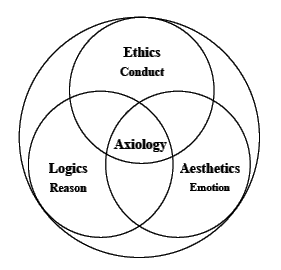
 Similarly for the Philosophy of Nature, the two lower fields of study—Aesthetics and Logics—serve as the hermeneutic basis for the field given in the upper circle: Ethics. Here, however, the apparent hierarchical structure is actually leveled out by the fact that the focus of the Philosophy is the World itself, rather than being just a component of the world. Thus, even though Aesthetics and Logics constitute a basis for Ethics, each of the three are equally important components in the Philosophy of Nature. Similarly for the Philosophy of Nature, the two lower fields of study—Aesthetics and Logics—serve as the hermeneutic basis for the field given in the upper circle: Ethics. Here, however, the apparent hierarchical structure is actually leveled out by the fact that the focus of the Philosophy is the World itself, rather than being just a component of the world. Thus, even though Aesthetics and Logics constitute a basis for Ethics, each of the three are equally important components in the Philosophy of Nature.
 Aesthetics, the study of Perception and Emotion, provides the fundamental data and theories about our conscious experience of the universe. Logics, on the other hand, concerns itself with structures and processes that constitute existence in a world. So Aesthetics thus tells us how our minds work and how the mind fabricates Reality; and Logics tells us what Form is, what it means to have a form, in terms of the potential and actual structures found in the universe. Much of traditional philosophy constitutes a large part of these two fields of study. All of the natural sciences are included here as well; as are the social sciences; and even the mathematics that can be used to explain so intimately these particular fields of empircal investigation reveals to us the existence of what are called pure mathematical forms. Aesthetics, the study of Perception and Emotion, provides the fundamental data and theories about our conscious experience of the universe. Logics, on the other hand, concerns itself with structures and processes that constitute existence in a world. So Aesthetics thus tells us how our minds work and how the mind fabricates Reality; and Logics tells us what Form is, what it means to have a form, in terms of the potential and actual structures found in the universe. Much of traditional philosophy constitutes a large part of these two fields of study. All of the natural sciences are included here as well; as are the social sciences; and even the mathematics that can be used to explain so intimately these particular fields of empircal investigation reveals to us the existence of what are called pure mathematical forms.
 Axiology, the study of the Value of the components of the empirical world, considers those data provided by the three fields in the Philosophy of Nature—Aesthetics, Logics, and Ethics—and attempts a systematic ranking of the components of the empirical world implied by these data, as well as by certain humanistic considerations. Aesthetics, the theory of the Awesome, uses Pathos or Emotion to evaluate the enformed beings rationally evaluated in Metaphysics by Logos, whereas Ethics brings both Pathos and Logos together to transform our Ethos into an Ethnos, to develop our "behavior" into a "cultured society". Axiology, the study of the Value of the components of the empirical world, considers those data provided by the three fields in the Philosophy of Nature—Aesthetics, Logics, and Ethics—and attempts a systematic ranking of the components of the empirical world implied by these data, as well as by certain humanistic considerations. Aesthetics, the theory of the Awesome, uses Pathos or Emotion to evaluate the enformed beings rationally evaluated in Metaphysics by Logos, whereas Ethics brings both Pathos and Logos together to transform our Ethos into an Ethnos, to develop our "behavior" into a "cultured society".
|

